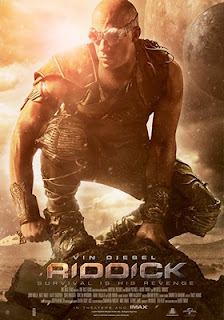
In Riddick’s first appearance in Pitch Black, he is a convicted criminal who is kept in chains. His motivations are a complete mystery except for his will to survive. When the freighter that imprisons him is marooned, he escapes. The climax is profound. He saves himself from alien creatures, but counter to his base instincts, he goes back to save others due to the heroic actions of the ship’s pilot. Yet his effort is in vain since the woman he allowed himself to care for, the pilot, is killed. He becomes emotional. Those silver “shined” eyes of his, which give him the ability to see in the dark, begin to water. He saves a couple of the marooned freighter passengers, but not the pilot. The ending is all about Riddick as an anti-hero who does not save the day.
In the Chronicles of Riddick, a passenger he saved in Pitch Black, a girl who pretended to be a boy, is now a woman. And against all odds Riddick takes on the Lord Marshal of the Necromongers to save her. But again, his effort is in vain. As in the first movie, the one he allows himself to care for is killed. This time the tears are more evident in those silver “shined” eyes, even though he inadvertently becomes the Lord Marshal. The ending is, again, all about Riddick as an anti-hero who does not save the day.
(Spoilers follow)
In Riddick, he again loses the one he cares for. Only this time it’s an alien jackel. Wait. What? Though I enjoyed Riddick’s connection to an alien creature (sort of like Han Solo and Chewbacca), it undermines the evolution of his character. The script fails to allow Riddick to make a true human connection. Unlike the previous movies, this time Riddick only wants to save others in order to save himself. In fact, Riddick is the one who needs to be saved. Consequently, the ending is NOT about Riddick failing to save the human he loves. It’s more about some of the mercs (short for mercenaries) showing nobility, and I HATED that. It’s akin to a Star Trek landing party where everyone gets killed except for the guy in the red shirt. The mercs, throughout the entire Riddick canon, have never shown any nobility. It’s almost as if writer/director David Twohy tried to give us a surprise ending for Riddick in which there are no tears. And that, for me, ruins the essence of Riddick’s anti-heroism.
Still, I’m giving this movie a thumbs-up. It’s classic adventure sci-fi on an alien world, and Riddick’s struggle against alien creatures works, even though it borrows from Pitch Black. If you’ve enjoyed the previous movies, animation, and games, you should have a good time with this movie.
Riddick also does a good job of setting itself up for a sequel - and I want that movie to be made. I think the fourth installment should be called Riddick’s Revenge. I expect an epic clash between Riddick and the guy who betrayed him, Vaako (Karl Urban), who I presume to be the new Lord Marshal of the Necromongers. Vaako has no idea that Riddick still lives with revitalized animal instincts learned through the ultimate test of survival. He’s primed to go after his nemesis. And I’m primed to see Riddick as the anti-hero once more.
By Mark Schelske
